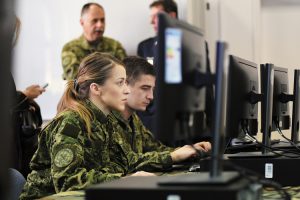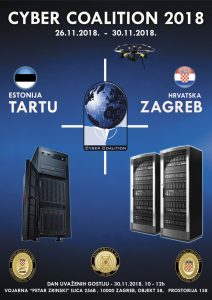The Croatian Armed Forces co-operate with the Minnesota National Guard in developing of the cyber…
Powerful Tool in Fight against Cyber Crime
 Cyber Coalition 2018 is one of NATO’s largest and most renowned exercises in the domain of cyber defence. Organized by the Allied Command Transformation (ACT), it was held on several dozen locations in participating countries from 26th to 30th November. The Directorate of Intelligence Affairs of the General Staff of the Croatian Armed Forces was responsible for the conduct of the international exercise in Croatia. The 11th edition of the exercise gathered more than 700 participants from 28 NATO member countries, four partner countries as well as the industry and the academia.
Cyber Coalition 2018 is one of NATO’s largest and most renowned exercises in the domain of cyber defence. Organized by the Allied Command Transformation (ACT), it was held on several dozen locations in participating countries from 26th to 30th November. The Directorate of Intelligence Affairs of the General Staff of the Croatian Armed Forces was responsible for the conduct of the international exercise in Croatia. The 11th edition of the exercise gathered more than 700 participants from 28 NATO member countries, four partner countries as well as the industry and the academia.
The Croatian Armed Forces’ team, comprised of 20 employees of the Communication and Information Systems Command and the Directorate of Intelligence Affairs, conducted its activities in Barracks “Petar Zrinski” in Zagreb, while two members of the Croatian Armed Forces were sent to NATO’s cyber range in the Estonian city of Tartu, from where the exercise was directed. It is no coincidence that Estonia was chosen as the headquarters of cyber defence, since this Baltic country is considered to be the first victim of the cyber attack from the year 2007 and has since been an example of excellence in developing cyber defence.
“Military exercise Cyber Coalition 2018 is very important for the Croatian Armed Forces and the Communication and Information Systems Command because it provides us with new insights about cyber warfare. The command is situated in Estonia, where two of our exercise controllers are. We communicate with them and use their leads to track the situation in NATO’s exercise scenario,” the Commander of the Communication and Information Systems Command Lieutenant Colonel Darko Vuković explained.
The exercise’s scenarios are made up and adjusted to the current situation in the world and potential threats the area of operations of the participating countries’ armed forces. The scenarios are sent from the headquarters in Tartu. The participating countries have to uncover the attack and determine the facts. It is necessary to detect the attack and send feedback on what was noticed and how the malicious code affects all other participants. This type of exercise is extremely important for all participants, for they gain capabilities which they can use should any of the scenarios from the conducted exercise happen in real life.
The representatives of the Communication and Information Systems Command used the exercise as an opportunity to reflect on the biggest challenges they come across in their work. The lack of manpower is defined as one of the biggest problems that cyber defence systems are faced with. It is therefore necessary to find a way to attract and keep skilful personnel. In combating cyber attacks, it is important to raise awareness on all levels of society, while employees of public institutions need to be specifically educated on their role in combating this type of attacks. For many, co-operation is the most important component of effective cyber defence. As cyber attacks become more sophisticated, no institution is capable of warding them off on its own. It is only through joint action by the public and private sector, the academia and state institutions that a joint, co-ordinated and systematic approach can be developed.

Exercises are one of the most efficient tools used in the development of cyber defence. Their objective is to strengthen the co-operation and co-ordination between NATO and its member countries, improve the possibilities of guarding cyberspace and conduct military operations in the cyber domain. The use of cyberspace by governments, state institutions, organizations and companies in their operations is increasing, which magnifies the risk of hackers’ attacks. Such attacks are today considered to be the greatest threat to world peace and security. At the NATO summit in Warsaw in 2016, cyberspace was officially recognized as the fifth dimension of warfare, with the success of military operations in land, sea, air and space being greatly dependent on the possibility of accessing cyberspace. Cybercrime is the fastest-growing security challenge of our time, which makes cyber security a priority for NATO and its member countries. The Alliance is threatened more often than ever before and the threats are growing more complex, with an attack on one member country having the potential to compromise the whole Alliance. Strengthening cyber defence is therefore a priority for the Alliance and its member countries.
The Republic of Croatia began participating in Cyber Coalition in 2009 as an observer and has been an active participant since 2013. Since 2016, the Directorate of Intelligence Affairs of the General Staff of the Croatian Armed Forces, on behalf of the Ministry of Defence, has been responsible for co-ordinating the preparation and the execution of the exercise. It is important to note that, apart from experts from the Ministry of Defence and the Croatian Armed Forces, participants from other state institutions, the academia and the private sector are also involved in the exercise.
Cyber Command for Communication and Information Systems and Cyber Affairs of the Croatian Armed Forces
The Distinguished Visitors’ Day in military exercise Cyber Coalition 2018 was organized in Barracks “Petar Zrinski” in Zagreb on 29th November 2018. The participants of the exercise were visited by the Director of the General Staff of the Croatian Armed Forces Vice Admiral Robert Hranj, the Head of the Communication and Information Systems Directorate Brigadier General Ante Tolić, the Head of the Ministry of Defence’s Independent Sector for Information and Communications Colonel Bruno Bešker and others.
A brief history of military exercise Cyber Coalition from 2008 until today was recounted in a short introductory presentation. The objectives of the exercise were recalled and the development of the Ministry of Defence and the Croatian Armed Forces’ capabilities in the domain of cyber defence were recapitulated. The emphasis was laid on the planned establishment of the Command for Communication and Information Systems and Cyber Affairs at the beginning of 2019. In the final presentations, this year’s scenarios were described. Afterwards, the guest visited the participants of the exercise and their work areas.
Text by DORIS RAVLIĆ, PETRA KOSTANJŠAK
Photo by MLADEN ČOBANOVIĆ
